NEWS ANALYSIS: Sami peoples were gathering in Trondheim this week to mark the 100th anniversary of the Nordic countries’ indigenous peoples’ first showing of national political solidarity. Their most troublesome issues in Norway remain the same, however, and that has raised questions over how much or how little progress has been made since February 6, 1917.
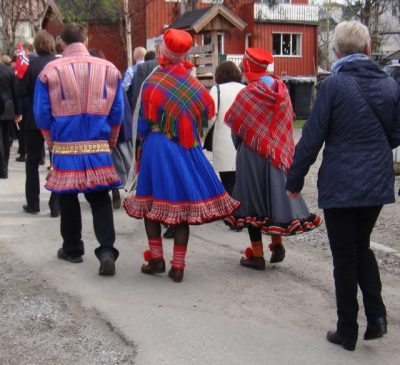
“We want to use this jubilee to celebrate Sami pride, our political battles and our progress,” Kirsti Bergstø, a Sami who comes from Nesseby in Finnmark, told newspaper Dagsavisen on Monday. Bergstø, who’s also a member of Norway’s Parliament for the Socialist Left party (SV) stressed, however, that “we also want to assess our status.” She has proposed the formation of a national “truth commission” to bring to light the darker sides of Sami history and the injustices Sami people have suffered at the hands of officials in Norway over the years.
That includes systematic attempts by Norwegian officials to force the Sami to assimilate into Norwegian culture, by banning Sami languages in the schools, for example, and all but forcing Christianity upon them. As Dagsavisen reported, the Sami culture and ways of life were also challenged, changed and denigrated with the help of state funding and state laws that continued well into the 1960s, when a Sami Council was finally established. It later evolved into the Sami Parliament that opened in Karasjok in 1989.
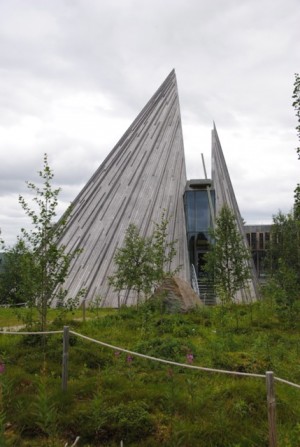
It was set up to represent Sami interests and is supposed to be consulted on all national interests that can affect them. That brings up once again the issues that were first raised at the landmark Sami gathering 100 years ago: Sami identity, Sami culture, Sami culture and the rights of Sami to the lands they’ve roamed and the waters they’ve fished in for centuries, as the indigenous people of what now are defined as Norway, Sweden, Finland and Russia.
“It’s easy for us to believe that because we now have Sametinget (the Sami parliament) and Sameloven (the national law meant to protect Sami rights) that we have corrected past wrongs,” political commentator Harald Stanghelle wrote in newspaper Aftenposten on Monday. “That’s not true.”
Stanghelle, as others, thus detect nearly as much frustration as there is celebration among the Sami gathering not just in Trondheim this week but all over the Norway and in the other countries with Sami First Nations. Stanghelle pointed, for example, to the ongoing debate over the Sami language, which also came up when the new president of Sametinget, Vibeke Larsen, held a traditional New Year’s address that’s broadcast on nationwide TV in Norwegian instead of in Sami. Larsen was criticized, but she defended herself by arguing that like many Sami, she never had the opportunity to learn a Sami language (there are more than one) while growing up. Now, as an adult, it’s not so easy to become bilingual.
Larsen, Bergstø, Stanghelle and many others including former Sametinget President Aili Keskitalo also have noted the battles over grazing and mineral rights: The Sami lost their battle against mining activity in Kvalsund that will further disrupt their reindeer grazing, and against the dumping of tailings from the mine in Kvalsund’s Repparfjord, which is otherwise rich in fishing grounds. And, noted Stanghelle, racism and discrimination periodically raise their ugly heads from Bodø to Tromsø and beyond, often in the form of bilingual signs posted on roads and at local borders like city limits. The Sami words and names for Norwegian cities and towns provoke some so-called “ethnic Norwegians,” prompting Internet trolls and even some local Norwegian politicians to post highly offensive online comments.
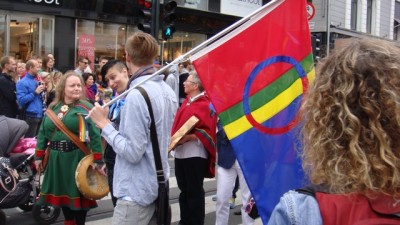
It all suggests that a lot more progress is needed, and the Nordic Sami-parliamentarians meeting in Trondheim this will be discussing a document entitled Forsoning og sannhet (Reconciliation and the truth). In line with Bergstø’s proposed “truth commission,” the document itself indicates acknowledgment that the Sami still have a long way to go in terms of feeling equal under the law and in a social sense.
There are bright spots: More people living in Norway than ever before have registered themselves as eligible voters in the Sami Parliament. Norwegian Broadcasting (NRK) reported Monday that 266 people had registered in January alone, seven times the number (31) in January 2013, when the last Sami elections were held along with national parliamentary elections. Inga Lill Sunset, leader of the Samepolitisk råd (Sami political council), linked the influx of new voters directly to Larsen’s New Year’s speech in Norwegian. While it was criticized by some Sami, “it probably led to others feeling like they were genuine Sami also, even though they don’t speak Sami, and they made an active choice to register themselves,” Sunset told NRK. “I think the speech showed that there’s a wider definition of what it means to be Sami.”
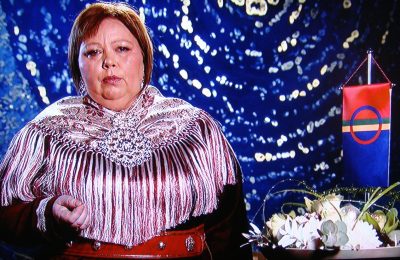
Anyone who has parents, grandparents or great-grandparents with Sami as the language spoken at home has a right to register, and vote in the Sami election, noted Larsen, who resigned as a member of the Labour Party after it failed to nominate her as its candidate for president of the Sami Parliament in September. She’ll now either run as an independent or join one of the other parties (both Norwegian and Sami) represented in it.
There’s also been a resurgence of Sami pride in Norway, evident when a young Sami woman who’s also from Nesseby in Finnmark won last year’s Norwegian qualifier for the Eurovision Song Contest, which led to Sami flags flying at the competition in Stockholm. In neighbouring Sweden, a new Sami film (Sameblod) is winning rave reviews and prizes at festivals, and will be shown in Venice, Berlin, Toronto and at Sundance in Utah in the US. The popularity of the annual Sami and other indigenous cultures’ festival Riddu Riddu in Troms is higher than ever. Sami flags also flew during last year’s gay pride parades and there’s visibly more of the Sami national dress worn also Norway’s own national day on the 17th of May.
Per Heimly, a celebrity photographer, told Dagsavisen on Monday that he, for example, proudly wears the Sami-kofte his mother made for him and he currently has an exhibition of Sami portraits and nature on display in Harstad. He doesn’t speak Sami either, though, saying that when he grew up in a small town in Nordland County, his childhood was “characterized by shame and an inferiority complex. There was lots of bullying and harassment. I was also called a lappjævel (Lapp devil) and such, but I didn’t let it bother me. And when I was in my teens, it all turned around. Suddenly it was cool to be Sami. It was like an awakening.”
Perhaps it’s time for another “awakening” in Norway, given the degree of conflicts, also among the Sami themselves. Larsen said on Monday that she doesn’t see herself as a “noisemaker” who has recently plunged the Sami Parliament into conflict and, some say, chaos. “I’m just a woman who behaved like a man, and politics is politics,” she told Dagsavisen over the weekend. “The timing wasn’t perfect (for the president to be unseated less than year before the election) but if (Norwegian Prime Minister) Erna Solberg hadn’t received support for her state budget like the (former Sami president hadn’t), (opposition leader) Jonas Gahr Støre would have had to take over. So did I.” Larsen, no longer a member of Støre’s Labour Party, also claimed that “my loyalty lies with the Sami people, not with a political party.” She sees preservation of the Sami culture and language as the two most important issues at present, and that “our language policies must change.”
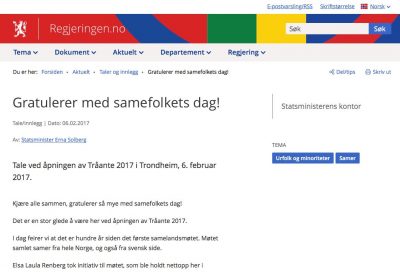
Norway claims 55 percent of the total Sami population, acording to Sametinget, compared to 20,000 in Sweden, 8,000 in Finland and 2,000 in Russia. As the Sami and others take part this week in meetings, seminars, concerts and cultural performances, among those in the audiences will be royalty, heads of state and many other top politicians. King Harald V and Prime Minister Erna Solberg were in Trondheim on Monday, and Stanghelle suggested that it would be wise for all the dignitaries, especially those with political power, to pay attention to the signals being sent. The Sami in Norway, for example, have decried Solberg’s government’s budget cuts for Sami projects, especially Sørsamiske (Southern Sami) schools. They’re unhappy Solberg’s government approved mining in Kvalsund and dumping in sensitive fjords. “Some ministries are good at asking (what Sami representatives think) while others only have pro forma consultations because they’ve already made a decision in advance,” Larsen said.
Solberg, who was also at the Tråante 2017 gathering in Trondheim on Monday, acknowledged the need to “set right” the mistakes of the past. She claimed that a special commission’s report on the Sami language, presented last fall, “lays a good foundation for further work with the Sami languages,” and she promised the work will be followed up by the Norwegian Parliament “in close cooperation with the Sami Parliament.” She said she was glad efforts were being made in cities like Trondheim to offer a Sami day care center since many Sami have moved to more urban areas.
She’ll likely be held to her words. “All of us here in the south (southern Norway, and Oslo in particular) should pick up the (Sami) signals, that even in 2017, the Norwegian sins of the past can come up again with destructive force in the Sami reality,” Stanghelle of Aftenposten wrote. “In Trondheim, with the official power elite represented, they must listen … because under the surface, frustration among Sami youth is growing.” That could spoil the party in Trondheim, Stanghelle noted, but it must be recognized that there’s despair “that we (Norwegians and Sami alike) haven’t come further.”
newsinenglish.no/Nina Berglund

